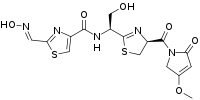Althiomycin
Althiomycin (matamycin) is a thiazole antibiotic, effective against Gram-positive and Gram-negative bacteria. The name matamycin is from "Mata Hari"[1] and the suffix -mycin.
 | |
| Names | |
|---|---|
| IUPAC name
N-[2-Hydroxy-1-[4-(3-methoxy-5-oxo-2H-pyrrole-1-carbonyl)-4,5-dihydro-1,3-thiazol-2-yl]ethyl]-2-(nitrosomethylidene)-3H-1,3-thiazole-4-carboxamide | |
| Other names
Altiomycin; Matamycin | |
| Identifiers | |
3D model (JSmol) |
|
| ChemSpider | |
PubChem CID |
|
| |
| |
| Properties | |
| C16H17N5O6S2 | |
| Molar mass | 439.46 g·mol−1 |
Except where otherwise noted, data are given for materials in their standard state (at 25 °C [77 °F], 100 kPa).
Infobox references | |
Isolated from Streptomyces matensis, the compound was first described by Margalith et al. in 1959.[2] It acts a protein synthesis inhibitor and its site of action is the 50S subunit of the bacterial ribosome.[2]
References
- Aronson J (October 1999). "That's show business". BMJ (Clinical Research Ed.). 319 (7215): 972. doi:10.1136/bmj.319.7215.972. PMC 1116803. PMID 10514162.
- Pestka S (1975). "Althiomycin". In Corcoran JW, Hahn FE, Snell JF, Arora KL (eds.). Mechanism of Action of Antimicrobial and Antitumor Agents. Antibiotics. Berlin Heidelberg: Springer-Verlag. pp. 323–6. doi:10.1007/978-3-642-46304-4_21. ISBN 978-3-642-46304-4.
This article is issued from Wikipedia. The text is licensed under Creative Commons - Attribution - Sharealike. Additional terms may apply for the media files.